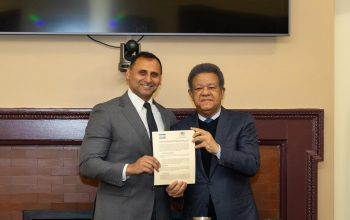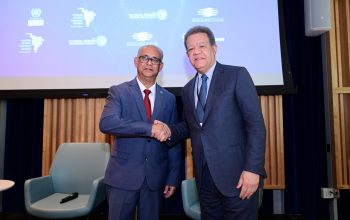news
The IV Forum on Latin American Democracy: President of GFDD and FUNGLODE calls for Latin America to Strengthen Its Social and Democratic State of Law
October 10, 2013
The former President of the Dominican Republic, Dr. Leonel Fernández, declared on Thursday in this city that, to avoid pessimism taking root in the region, Latin America has to work with a view to defining and implementing a new development model, which should be consistent and in harmony with the consolidation of a social and democratic state of law.
Fernández made this statement in the context of his keynote address at the IV Forum on Latin American
Democracy. On this occasion, he made a presentation on the subject "Poverty and Representation Crisis: toward a more or less social cohesion in 2020?" The panel moderator and commentator was Dr. Flavia Freidenberg, an Argentine-Spanish academic.
The IV Forum on Latin American Democracy: President of GFDD and FUNGLODE calls for Latin America to Strengthen Its Social and Democratic State of Law
The former Dominican Head of State, who currently presides over non-profits GFDD and FUNGLODE, explained that to achieve this goal, Latin America should accept the idea that it takes a combination of two models: the first would be labor-intensive and the second capital-intensive. These, in addition to a strong technological base, would result in goods and services with higher value added.
"This strategy would generate a greater volume of wealth and, therefore, would increase the annual gross domestic product, which in turn would lead to an increase in per capita and higher productivity," Fernández indicated. He stressed that the economic and social future of the region is linked to its ability to generate increased productivity, competitiveness and innovation within a context of global interdependence.
At another point in his
address, Fernández acknowledged that the region still displays worrying levels of social inequality, insecurity, and institutional weakness, which generate concern. However, he said that the situation has much to do with the new challenges that democracy is experiencing. "I would say that all this has to do with the issue of the legitimacy of access to power, which translates into economic and social demands. And, at the same time, it has to do with institutional strengthening and
community participation," he said.
Regarding community participation, institutional strengthening and transparency, the former President said that the countries of the region have made great progress in instituting constitutional reforms and adopting laws that limit presidential power. "Whereas in the past there was talk in Latin America of a chronic presidential rule, today the constitutional reforms that have been
implemented seek to limit the exercise of power, and this has been sponsored by the States themselves," he said.
In this regard, he recalled that, until a few years ago, there were no standards in Latin America for a recall referendum, which exist in some constitutions of the region today. Nor were there popular legislative initiatives or constitutional courts, which today underpin citizens’ rights.
In addition, he stressed the
importance of the laws that provide access to public information, which he said are a way to guarantee transparency, also noting that many countries have enacted bidding laws that have put an end to the practice of delivering public works in stages.
"Thus, this represents a major improvement, even though it is still inadequate, because we always assume that democracy is an experiment, even a permanent one," Fernández said.
About the protests
In regard to the protests that are staged in some countries of Latin America, Fernández stated that they have a global character, noting that actions of this kind regularly take place in distant countries, such as in Indonesia and in Thailand. "The protests are not taking place in Haiti, they are in Brazil and, therefore, they differ from the traditional social protests that occurred in Latin America and other parts of the
world in the past," proclaimed the former Dominican Head of State.
According to Fernández, the protests are a revolt of the middle class, which, he said, has been adversely affected by the deterioration in its quality of life. This, in turn, has been caused by an extension or the continuation of the 8-year long global economic crisis and which does not seem to have a foreseeable end. "Governments, compelled by the markets, apply restrictive policies. It
is what we have called at some point técnica de los golpes de mercado, resulting in a global revolt of the middle class, which uses social networks to mobilize its resources," he explained.
Fernández said that as a result of the globalization process, and due to the low tax burden, in many Latin American countries, including the Dominican Republic, there is an overload of social demands and an inability on the part of the
governments to meet them.
"In Mexico and in the Dominican Republic the tax burden is only 13 percent… These are poor countries that are trying to respond to the increasing demands of a social structure that has been mutating from poor to middle class," he said.







